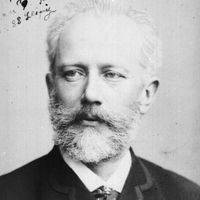Pyotr Ilyich Tchaikovsky (07.05.1840–06.11.1893)
Pyotr (Peter) Tchaikovsky was a Russian composer, pianist and conductor, who occasionally visited Leipzig and also performed as a guest here.

1. Biography
Pyotr Ilyich Tchaikovsky was born on May 7th, 1840 in Votkinsk in the Russian Empire. The young Peter, one of six children of the mining engineer Ilya Tchaikovsky and his wife Alexandra, received piano lessons at the age of four, but two years later he was already playing better at sight than his teacher. As a child he seemed to have been particularly sensitive and was very interested in poetry and music, which was encouraged by his French tutor Fanny Dürbach. As the profession of musician was not highly valued in Russia at the time, his parents sent him to the Imperial Law School in 1849 – a boarding school that prepared sons of the lower and middle nobility for careers in the civil service. Outside of school, he received piano lessons from Rudolph Kündiger. After graduating from school in 1859, he was hired as a secretary in the Ministry of Justice. However, he gave up this position four years later. From 1861 he attended music classes with Anton Rubinstein, under whom he studied composition and instrumentation, and he broadened his musical horizons by attending rehearsals, concerts and opera performances.
Tchaikovsky, by now almost penniless, began teaching harmony at the Moscow Conservatory founded by Rubinstein's brother Nikolai in 1866. He also received accommodation from him. Later, he received financial support from the widow of a rich railway entrepreneur, Nadezhda Filaretovna von Meck, for almost 15 years. She thus enabled him to live the life of a freelance artist.
Between 1878 and 1885 Tchaikovsky made numerous trips abroad and spent some time with his sister and his favourite brother Anatoly. In 1885 he found a permanent place of residence near Klin.
Although he found it difficult to perform in front of an audience, he began conducting his own works in 1887 and undertook concert tours, both within Russia and abroad, for example to the USA and Western Europe. At the age of 44, he received the Order of St. Vladimir from Tsar Alexander III – an award that significantly raised his social status. Four years later he was appointed a corresponding member of the Royal Music Institute in Florence. In 1891, he was admitted to the Society for the Promotion of the Performing Arts in Amsterdam, and a year later to the Institut de France (Académie des Beaux Arts). Shortly before his death, he received an honorary doctorate from Cambridge.
Peter Tchaikovsky died unexpectedly on October 25th, 1893 at the age of 53 in the flat of his brother Modest and his nephew Vladimir in St Petersburg and was buried at the request of Tsar Alexander III at his expense in the cemetery of the Aleksandr Nevsky Monastery.
2. Private Life
Tchaikovsky was particularly close to his mother, his only sister – whose family became a second home to him – and the twins Anatoly and Modest. The latter founded the Tchaikovsky Museum after Peter's death.
He constantly questioned himself and his work. His self-critical nature even went so far as to destroy the score of his symphonic ballad The Voyevoda after its premiere in 1891. Tchaikovsky suffered from self-doubt throughout his life and often escaped into seclusion to work. “To regret the past, to hope for the future and never to be satisfied with the present, that is my life,” he once said.
Despite his great successes, depression and other mental and physical illnesses prevented Tchaikovsky from enjoying his fame.
In his Moscow years, he became engaged to the singer Désirée Artôt, 5 years his senior, but soon found that his enthusiasm was limited only to her talent. Instead, after three months at the age of 37, he married Antonina Miliukova, about whom little is known. Due to his homosexuality, which was kept secret, this marriage failed after only a few months when he fled to his sister in the country. From then on, the couple lived separately, but did not divorce.
However, he had a close relationship with his patron Nadezhda von Meck. They wrote each other a total of over 1200 letters, but both avoided a personal meeting. The break-off of their financial and postal relationship is probably due to the insistence of her children.
Tchaikovsky was not only active as a composer, but also as a music critic. He made his opinions on various fellow musicians public, for example his dislike of the compositions of Brahms or Liszt, but also his praise for those of Grieg or Schumann.
When he came to Leipzig for the first time in 1888 to begin his European tour, he met, among others, the Grieg couple, with whom he became close friends from then on.
On his travels, he met numerous composers, such as Brahms, Busoni, Dvořák, Grieg, Liszt and Massenet, all of whom he appreciated in different ways. He also promoted young composers such as Rachmaninov, in whom he saw great potential.
3. Connection to Leipzig
Pyotr Ilyich Tchaikovsky travelled to Leipzig on December 31st, 1887 to begin a major European concert tour. Even the Liszt Society had organised a festive concert in his honour at the Old Gewandhaus. The first concert of his tour took place on January 5th, 1888 – conducted by himself – in the New Leipzig Gewandhaus, then one of the most renowned and largest concert halls in Europe.
The concert opened with the Suite for Orchestra, Op. 43, composed by Tchaikovsky himself, followed by Beethoven's Piano Concerto in G major with pianist Fanny Davies and several art songs by composers such as Franz Schubert and Robert Franz. The Leipzig audience, otherwise considered rather reserved, received the concert almost enthusiastically, so that the start of his tour was a great success. On his travels abroad, Tchaikovsky met numerous composers and soloists. In Leipzig in 1888, he again met the violinist Adolph Brodsky, who had premiered his Violin Concerto in a legendary concert in Vienna in 1881. Tchaikovsky had actually dedicated it to the violinist Leopold Auer, but he judged it unplayable. During his stay in Leipzig with the Brodsky family – they lived at 21 Kaiser-Wilhelm-Strasse (today's August-Bebel-Strasse) – he met Grieg and Johannes Brahms and also Arthur Nikisch, who conducted in the Leipzig theatre, and Carl Reinecke, then the music director of the Gewandhaus.
Tchaikovsky's connection to Leipzig is also evident in the publication of his romances and piano works by Hugo Riemann as early as the end of 1870.
4. Reception
Since at least the end of the 1870s, Peter Tchaikovsky was considered a celebrated and honoured conductor and composer in Russia, but also in Western Europe and the USA, thanks to his extensive concert tours, on which he also performed many of his own works. This is shown by the appreciations and honours he received in Italy, England and France, for example, and the great successes he enjoyed in cities such as Berlin, Vienna and Paris for his orchestral works, concertos and string quartets. His piano works and romances were reprinted in other Western countries. International audiences also hold his compositions and his work as a conductor in high esteem. Tchaikovsky's final years were marked by great fame abroad, but especially in Russia, where he was celebrated as a national hero. His late important stage works, such as The Nutcracker and Sleeping Beauty, also brought him financial success.
5. Works
Operas (selection)
- The Voyevoda (Воевода), 1867/68, destroyed by the composer
- Undina (Ундина), 1869, only fragments were preserved
- The Oprichnik (Опричник), opera in four acts after Ivan Ivanovich Lazhechnikov (1870–1872; Libretto: P. Tchaikovsky; premiere: St Petersburg 1874)
- Eugene Onegin (Евгений Онегин), opera in three acts after Pushkin op. 24 (1877/1878; Libretto: P. Tchaikovsky and K. S. Shilovsky; premiere: Moscow 1879)
- The Maid of Orleans, opera in four acts after Schiller (1878/1879; Libretto: P. Tchaikovsky; premiere: St Petersburg 1881)
- Mazeppa, opera in three acts after Pushkin (1881–1883; Libretto: W. P. Burenin; premiere: Moscow 1884)
- The Queen of Spades, opera in three acts after Pushkin op. 68 (1890; Libretto: M. and P. Tchaikovsky; premiere: St Petersburg 1890)
- Iolanta, opera in one act after Hertz op. 69 (1891; Libretto: M. Tchaikovsky; premiere: St Petersburg 1892)
Ballets
- Swan Lake, ballet in four acts op. 20 (1875/1876; Libretto: Vladimir P. Begichev and Vassili Geltzer; premiere: Moscow 1877)
- The Sleeping Beauty, ballet in three acts after Perrault op. 66 (Libretto: Ivan Alexandrovich Vsevolozhsky; premiere: St Petersburg 1890)
- The Nutcracker, ballet in two acts after E. T. A. Hoffmann op. 71 (Libretto: Marius Petipa; premiere: St Petersburg 1892)
Theatre Music (Selection):
- Music for the play Dmitry the Pretender and Vassily Shuysky by Ostrovsky: Introduction and Mazurka (1867)
- Music for the play The Barber of Seville by Beaumarchais (1872)
- Music for the play The Voyevoda by Ostrovsky: monologue for woodwinds, harp and string orchestra (1886)
Orchestral Works
8 Symphonies
Other orchestral works (overtures, suites and solo concertos)
Chamber music (string quartets, piano trios and wind ensembles)
Piano works for two and four hands
Vocal music (songs, works for choir and orchestra, singing voice and orchestra and choir)
Numerous transcriptions and orchestrations
Audio Samples
The Sleeping Beauty, Suite from the ballet op. 66 https://www.youtube.com/watch?v=g2Cb9KBfmGU
Symphony No. 5 in E minor op. 64 (1888) https://www.youtube.com/watch?v=8tc8lpan6so
Piano Concerto No. 2 in G major op. 44 (1880-1881) https://www.youtube.com/watch?v=UXY_qU7bKPQ
6. Sources and Links
Glaab, Wolfgang: Tschaikowsky in Leipzig, Lehmstedt Verlag 2012.
Mitteilungen der Tschaikowsky-Gesellschaft (2006), http://www.tschaikowsky-gesellschaft.de/lebenundwerk.htm.
Stender, Lina: Peter Tschaikowsky, https://www.ndrticketshop.de/magazin/klassik/peter-tschaikowsky/.
Bildquelle:
Von Atelier E. Bieber, Hamburg (probably by Leonard Berlin (1841-1931)) - www.flickr.com/photos/bergen_public_library/5775463761/, Gemeinfrei, commons.wikimedia.org/w/index.php




